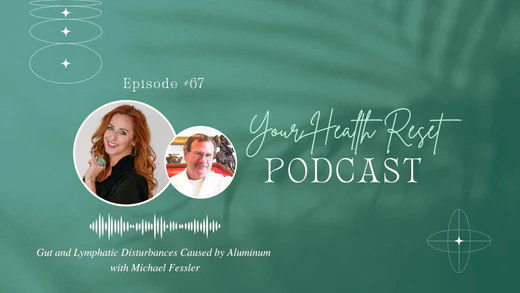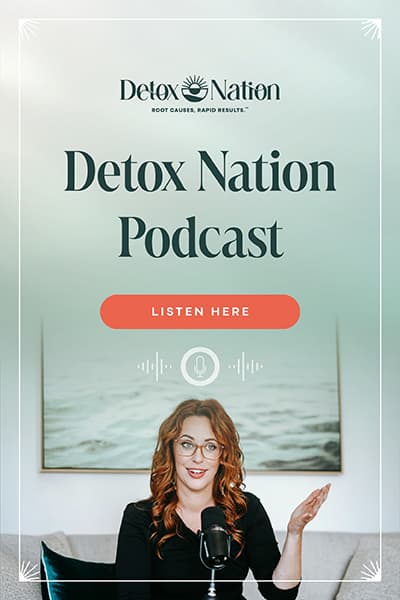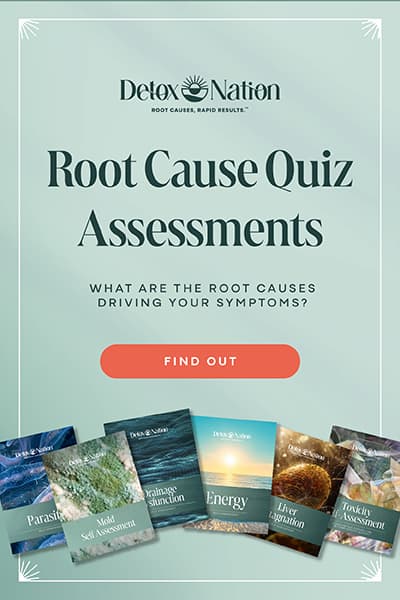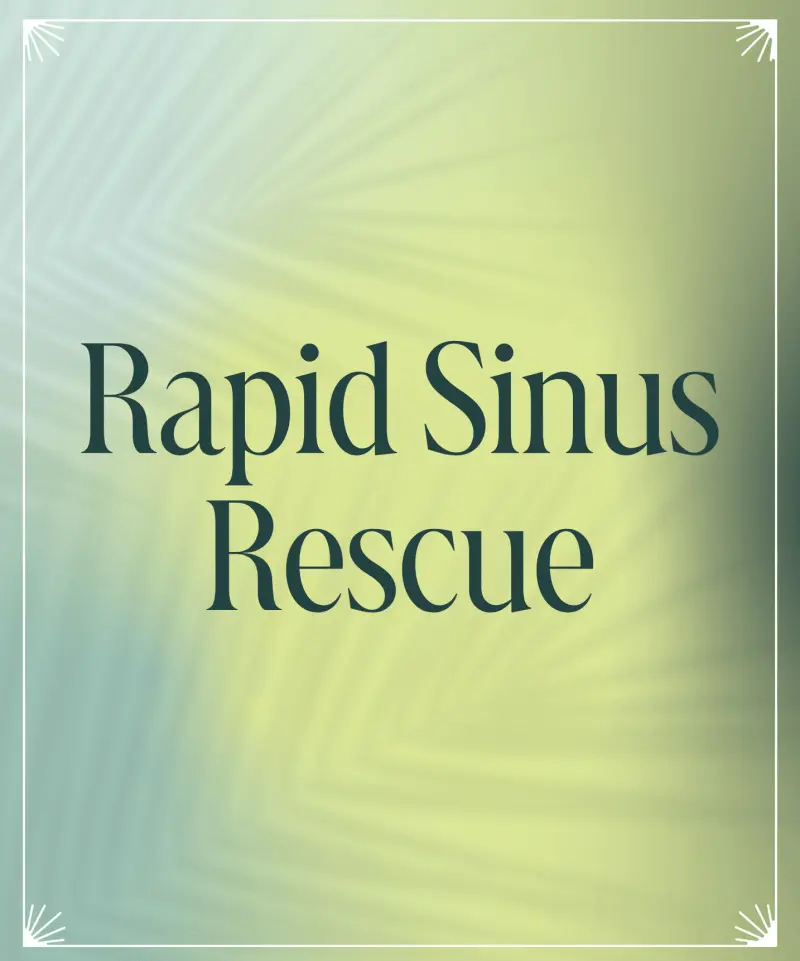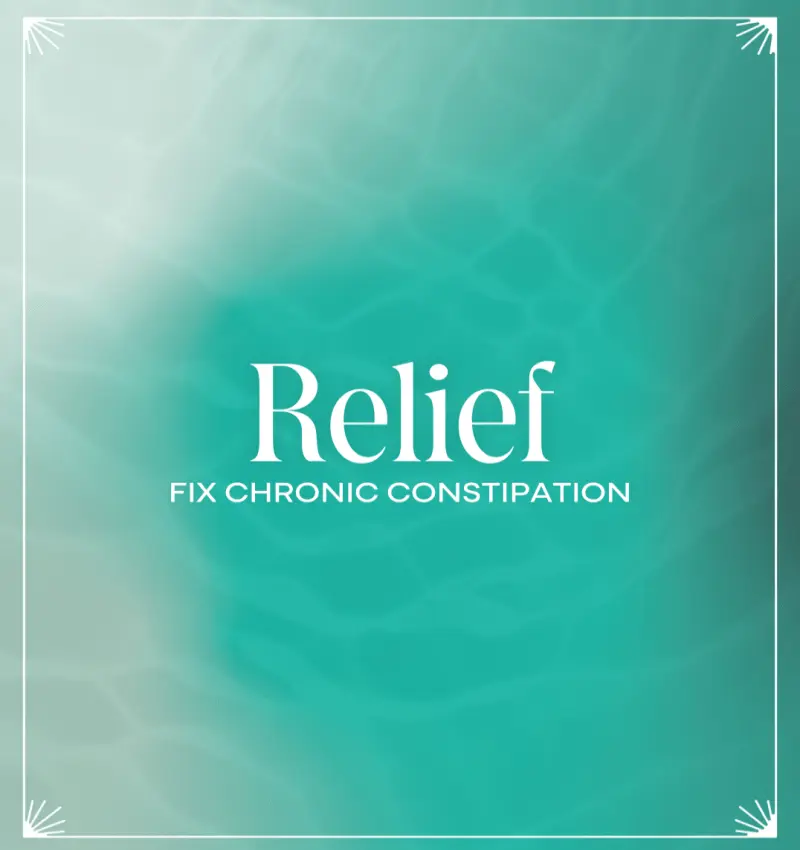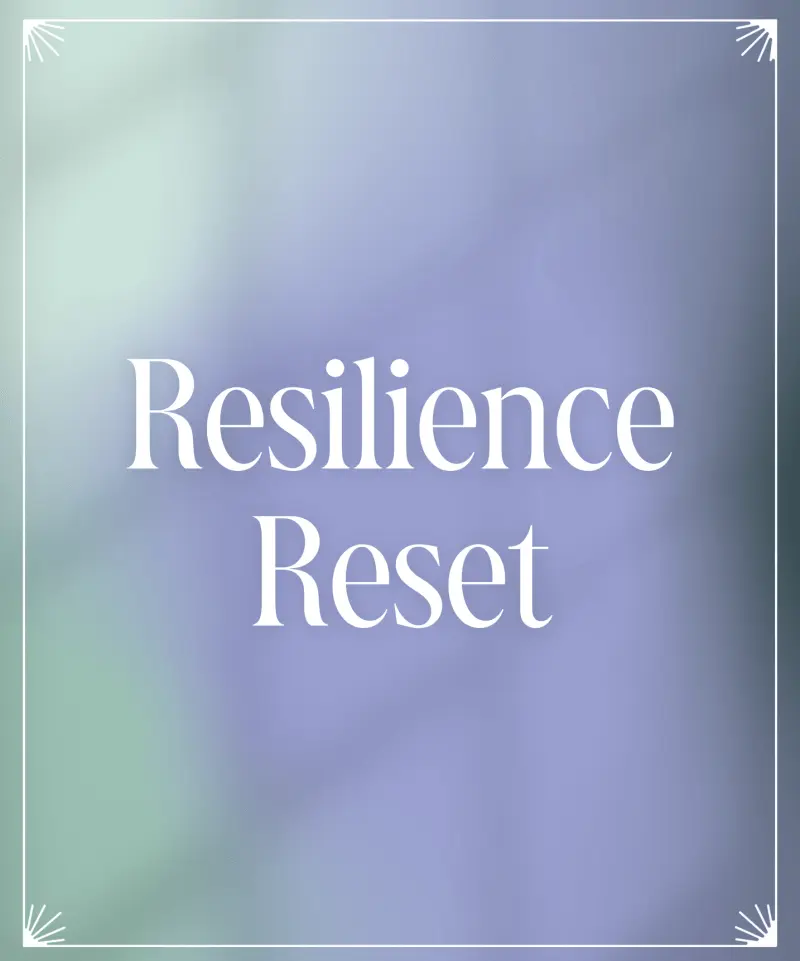Have constipation and bloating become your new ‘normal’? It’s easy to shrug it off, but constipation may signal bigger issues, like sluggish bile flow or unwelcome guests like parasites. Knowing the constipation danger signs could mean the difference between feeling like crap—or finally feeling like yourself again.
Alright, let’s talk about something we’ve all dealt with, but no one likes to admit — constipation.
Yeah, it sucks, but it’s fixable.
If you’re one of those people who dread sitting down at the toilet because it feels more like a wrestling match than a simple bodily function, let me introduce you to a hidden culprit: bile flow.
You know — that miracle fluid your liver and gallbladder whip up to help you digest fats and, yes, make poop.
Bile is like the unsung hero of your digestion system.
When it’s flowing like it should, life’s good.
You’re absorbing nutrients, keeping things moving, and avoiding that lovely backed-up feeling.
But when it’s not? Let’s just say, your gut becomes a sluggish mess.
And here’s the kicker—low bile flow is more common than you think.
From poor diet choices to those sneaky parasites making themselves at home in your intestines, there are plenty of reasons why your bile might be taking a little nap.
But what about when constipation is chronic and lasts for months – or (gulp!) years – on end? Are there danger signs you should be aware of?
You bet, and I’ve got you covered!
Ready to take a closer look at your “no-go” issue, including root causes, effects, and danger signs?
Let’s GO!
Key Takeaways
- Everyone deals with constipation on occasion.
- Root causes of constipation can include low bile, dysbiosis due to parasites, mold exposure, and toxicities, and more – but they can be reversed.
- There are constipation danger signs you should understand.
What is Constipation?
Constipation occurs when you have difficulty going “number 2,” or if it’s infrequent (7).
It can make you feel like you ate a boulder for breakfast – heavy, weighed down, and slow.
Then when you finally do poop, it can feel like you’re giving birth through your butt!
In general, you should have 2-3 bulky, formed, easy and regular bowel movements per day.
Be honest, are you freaking out a little right now?
I know – it seems like a lot. Yet when you consider that’s our body’s main way of “taking out the trash,” it makes sense.
But I’ve met thousands of people over my years in practice who only poo two to four times per month.
Their bodies are toxic and struggling to make it through the day. And nothing will change until they make a change.
Sound familiar?
Have you tried allll the things to relieve your constipation, only to be right back where you started? (Well, maybe a little lighter in the wallet.)
Perhaps you didn’t dig deep enough into the cause of your difficult to pass stool?
It’s not your fault – everyone tells you it’s all about hydration and fiber.
The reality is that it’s about so much more. And that conversation has to include bile flow and root causes such as parasites.
Bile Flow and Constipation
Bile plays a key role in digestion and can affect how well your body processes waste and makes poop. Reduced bile flow may slow digestion and cause uncomfortable hard stool.
What is Bile?
Bile is a miracle liquid made by your liver and stored (and concentrated) in your gallbladder.
It might just be the most incredible fluid in your body – but I guess that’s a topic for another time.
When you eat, your gallbladder contracts and squirts concentrated bile into your small intestine where it mixes with the contents of your stomach.
Bile helps your body digest fats by emulsifying them, breaking them down into smaller and smaller droplets.
This allows your intestines to absorb nutrients (especially the fat-soluble vitamins A, D, E, and K) and remove waste more effectively.
Without enough bile, your fat digestion is compromised, making you feel heavy, bloated, and constipated (4).
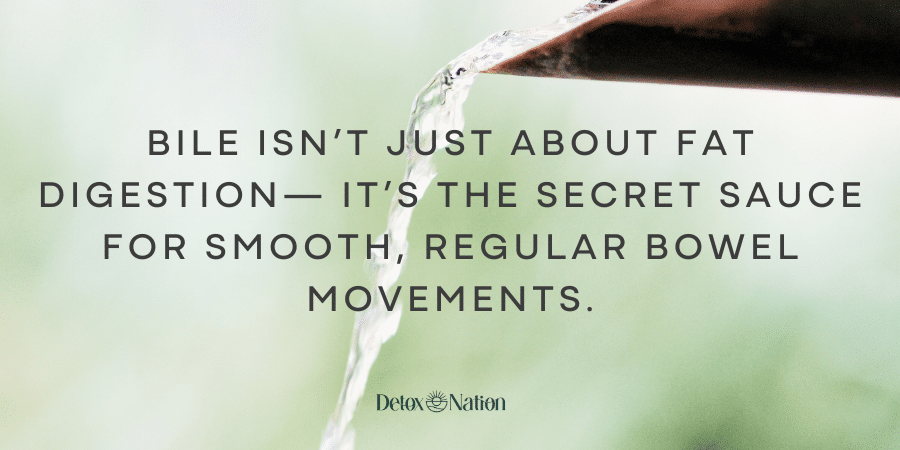
Bile and Motility
Bile also helps trigger peristalsis, which is the sequential, rhythmic contraction of muscles in your intestines that moves food along the conveyor belt of your gut.
It’s like “the wave” you see at sporting events, only in the muscles of your gut!
When bile flow is reduced, peristalsis slows, and this can lead to sluggish digestion and constipation.
Certain medications like cholesterol-lowering drugs and narcotic pain relievers may interfere with bile production and are known to cause constipation (6).
Causes of Low Bile
Low bile (AKA “cholestasis”) can result from several factors, including anything that interferes with your liver (like non-alcoholic fatty liver disease, hepatitis, cirrhosis, parasitic infection, mold toxicity, heavy metal or chemical exposure, and more).
Also, anything that affects your gallbladder – like stones or parasitic infection – can reduce bile flow.
If you’ve had your gallbladder removed, it can’t squirt bile into your small intestine in response to your meals.
It also can’t get concentrated.
Instead, you just have a steady drip of bile into your small intestines all the time, whether you need it or not.
This can cause diarrhea. (Lucky you – you get both constipation and diarrhea!)
But when you have that slice of pizza (or other fatty meal), there’s not enough bile in your intestines to fully break it down or to move it through your system.
The “conveyor belt” slows down.
You feel like crap (pun intended).
Some other causes of low bile include:
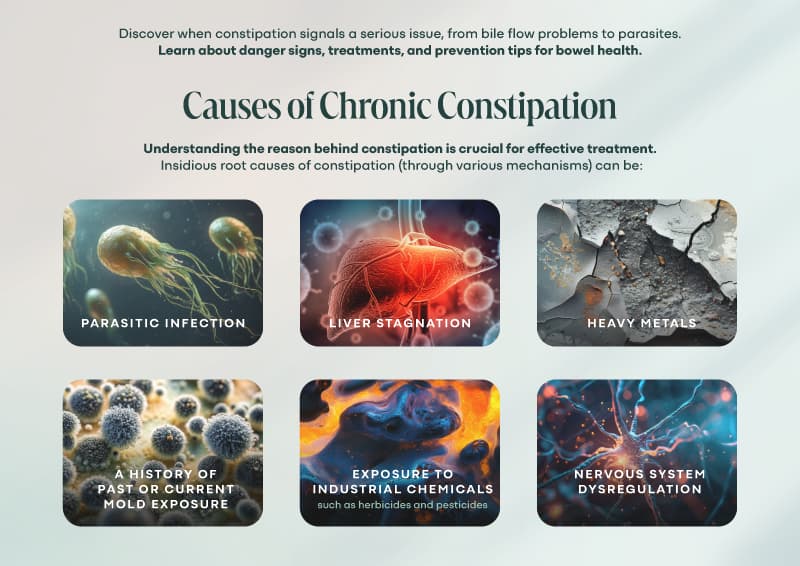
Parasites Can Cause Constipation
Parasites in your gut can cause several digestion problems, including constipation. These uninvited visitors can disrupt how your intestines work and lead to other symptoms that signal their presence.
How Parasites Affect Digestion
Parasites in your digestive tract such as roundworms, hookworms, and protozoa can significantly disrupt intestinal motility (1, 2, 3, 16).
They impair nutrient absorption, leading to various digestive issues.
When these freeloaders settle in your gut, they cause inflammation in the gut lining.
This inflammation affects the normal movement of the intestines and can result in constipation.
Parasites also change the composition of the gut microbiome, a condition called dysbiosis (19).
They can even physically block your bile flow or intestines!
Start by taking my Parasite Assessment Quiz, supporting your liver, getting your bile flow back on track, and kicking out any unwanted squatters in your gut (looking at you, parasites).
It’s not glamorous work, but it’s fixable—and once you’ve tackled the root causes, you’ll love how much lighter (literally and figuratively) you feel. Go ahead, give your gut the green light—it’s time to get things moving again. I’m rooting for you!
Take My Parasite Assessment Quiz NowSigns of a Parasitic Infection
There are several warning signs to look out for if you suspect a parasitic infection.
You might notice abdominal pain, run-to-the-bathroom diarrhea, and low-grade nausea.
Bloating that makes it hard to button your pants, stinky gas, and being “backed up” are also common symptoms (19).
You may have chronic hives or other skin rashes that make you want to scratch the day away.
As the infection persists, more serious signs like bloody stools, significant weight loss, anemia, or malnutrition might occur.
These invaders can even cause immune suppression, so you catch every cold that comes around (18) and neurological effects like brain fog making it hard to deal.
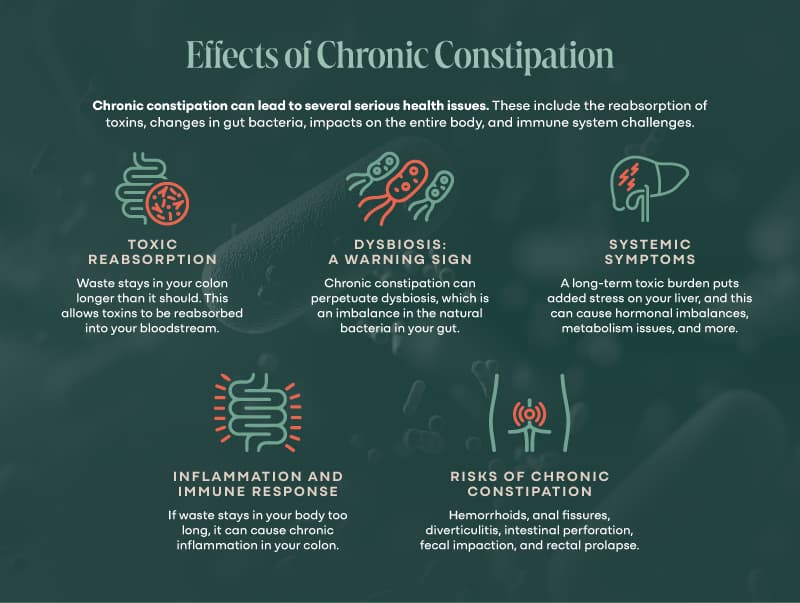
The Body and Persistent Constipation Symptoms
Chronic constipation can lead to several serious health issues. These include the reabsorption of toxins, changes in gut bacteria, impacts on the entire body, and immune system challenges.
Toxic Reabsorption
When you’re constipated, waste stays in your colon longer than it should.
This allows toxins to be reabsorbed into your bloodstream, increasing your toxic load.
You might experience symptoms like fatigue or brain fog as your body struggles to cope with the extra toxins.
Over time, a buildup of toxins can affect your organs and overall health.
Dysbiosis: A Warning Sign and A Cause
Chronic constipation can perpetuate dysbiosis, which is an imbalance in the natural bacteria in your gut.
Dysbiosis can be caused by parasites (19), mold toxicity (20), heavy metals (23), EMF exposure (22), industrial chemicals (21), and more.
This imbalance can lead to issues like irritable bowel syndrome (IBS) and leaky gut syndrome.
Systemic Symptoms of Constipation
The effects of chronic constipation aren’t limited to your digestive system.
But did you know constipation can also cause systemic issues?
One alarming study found an association between constipation and an increased risk of “major adverse cardiac events (15).” (Really? Are there non-adverse cardiac events?)
If you develop leaky gut syndrome, that can impact virtually every system in your body.
A long-term toxic burden puts added stress on your liver, and this can cause hormonal imbalances, metabolism issues, and more.
Inflammation and Immune Response
Constipation (and its root causes) can influence inflammation and immune response (1, 8, 11).
If waste stays in your body too long, it can cause chronic inflammation in your colon (8).
This can lead to conditions like colon inflammation or colon cancer and might suppress your immune system, making you more prone to illnesses.
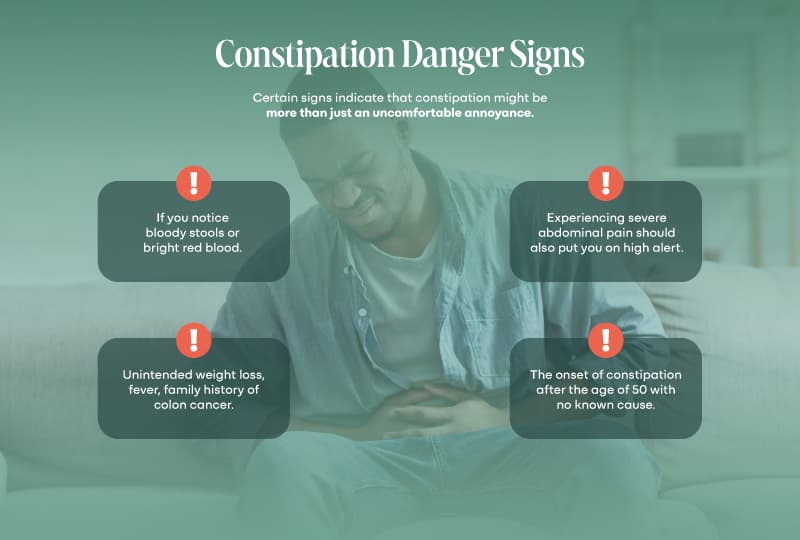
Constipation Danger Signs
Constipation can lead to more serious problems if not addressed promptly. Knowing when it becomes a significant health issue can help you seek the right care.
Risks of Chronic Constipation
Not going is no joke!
When constipation persists, it increases the risk of fecal impaction, where stool becomes stuck in the intestines. Gross, right!
Worse, fecal impaction can cause your intestines to perforate or tear, leaking toxins into your system.
It might also lead to rectal prolapse, a situation where part of the intestine protrudes through the anus.
So yes, by not pooping, you can experience fun things like itchy and burning hemorrhoids, painful anal fissures, diverticulitis, intestinal perforation, fecal impaction, and rectal prolapse due to straining (16, 19).
That almost sounds like the side effects rattled off in a prescription medication commercial.

Constipation Red Flags
Certain signs indicate that constipation might be more than just an uncomfortable annoyance.
If you notice bloody stools or bright red blood, this could mean hemorrhoids, intestinal tears or more serious conditions like bowel obstruction.
Experiencing severe abdominal pain should also put you on high alert.
Some other symptoms to watch out for include sudden constipation, unintended weight loss, fever, a family history of colon cancer, and the onset of constipation after the age of 50 with no known cause (12).
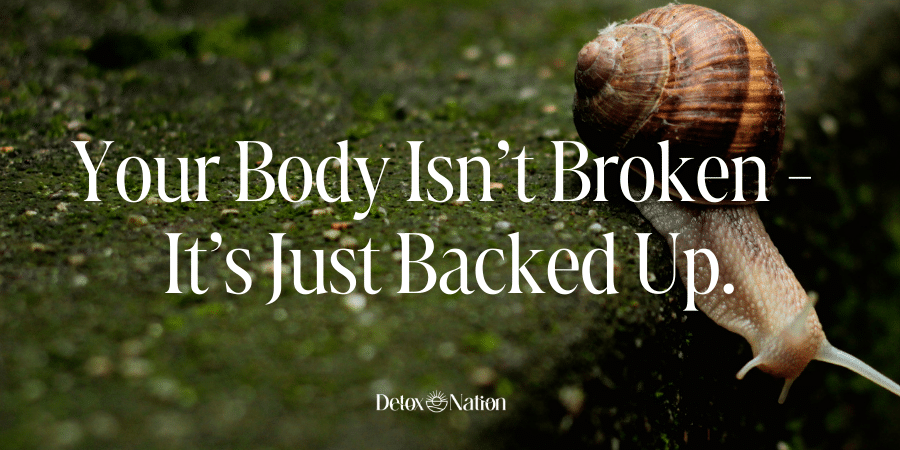
Natural Approaches to Constipation
Natural ways to relieve constipation often focus on finding the cause, making smart food choices, and adopting healthier habits. These steps not only aim to ease symptoms but also help prevent future issues.
Find the Root Causes of Constipation
Understanding the reason behind constipation is crucial for effective treatment.
Sure, in theory, it could be as simple as not drinking enough fluids, getting enough fiber or managing your stress.
In my experience, chronic constipation is not as simple as it seems.
Insidious root causes of constipation (through various mechanisms) can be:
- A history of past or current mold exposure
- Parasitic infection
- EMF exposure
- Heavy metals
- Exposure to industrial chemicals such as herbicides and pesticides
Constipation is a symptom of a larger issue.
The larger issues (root causes) ARE fixable, but only if you address them directly.
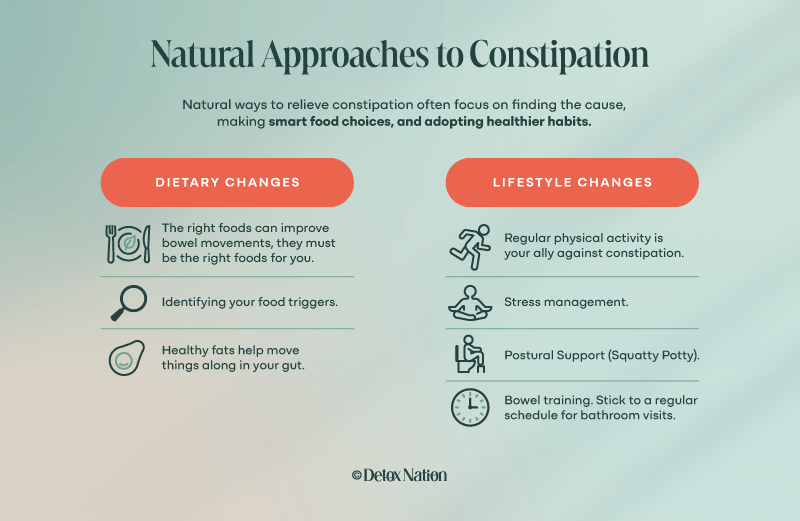
Dietary Changes
Eating the right foods can improve bowel movements, but they must be the right foods for you.
For example, high-fiber foods such as apples and broccoli may be helpful for some people, but they may cause gas, bloating, or other icky symptoms in your body.
Eating “healthy” foods your body reacts to does not help you. Identifying your food triggers does.
Don’t forget healthy fats like those found in avocados, as they help move things along in your gut.
Lifestyle Changes to Prevent Constipation
Regular physical activity is your ally against constipation.
Exercise stimulates the muscles in your intestines, helping with efficient bowel movements.
Activities such as walking or yoga can be beneficial.
Stress management is important, as stress affects digestion.
Find ways to relax, like meditation, Epsom salt baths, or grounding in nature.
Also, try bowel training by sticking to a regular schedule for bathroom visits.
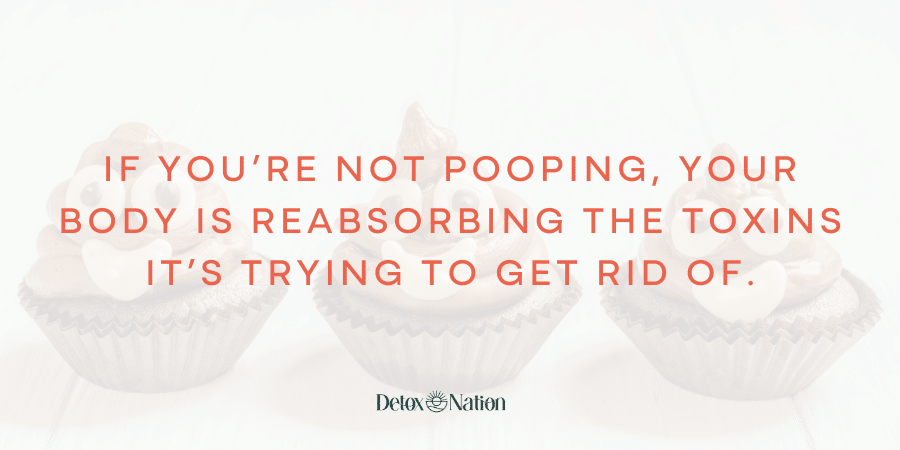
Supplements to Ease Constipation
Using an enema or natural stool softeners may be appropriate to help you with occasional constipation, but they shouldn’t be all you do to address chronic constipation.
Likewise, supplements can help in the short-term while you’re tackling root causes. They are not a replacement for resolving root causes!!
Let’s be real: You have to be able to poop to detox and get rid of parasites!
Some of my favorite, non-habit-forming supplements to temporarily relieve constipation are as follows:
- OxyPowder: Empowers the body to release stored trapped material. Take it on the way to dreamland for the best results, and away from other supplements. Fun fact: It’s common to see bowel consistency changes when using OxyPowder, odd textures and smells, etc. That’s a sign it’s working!
- Bowel Mover: This is more subtle and contains a light antiparasitic component. It’s fine to take with other supplements at any time of day, but is best taken away from food.
- Magnesium Citrate: A standard bowel support supplement that just helps things to gently move.
(Full disclosure: If you click & purchase through one of my links, I may receive a small commission at no extra cost to you. I only recommend tools I personally use and love!)
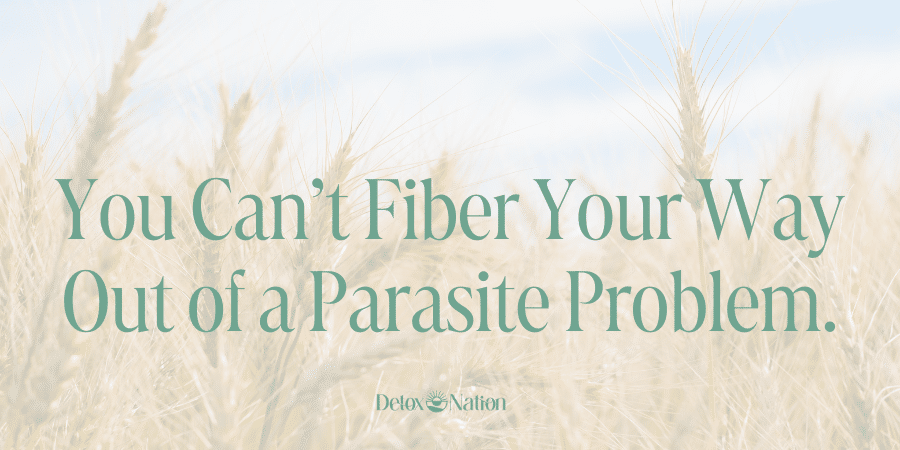
Conclusion
Constipation may seem like a minor inconvenience, but as we’ve seen, it can lead to some serious health issues if left unchecked.
And no, sitting around hoping the next fiber supplement is going to solve all your problems isn’t going to cut it.
The good news? This isn’t a life sentence.
Your body is built to heal. It just needs a little push in the right (root cause) direction.
Nobody can fix this for you, but you’ll be amazed at how quickly things can get moving again when you put in the work.
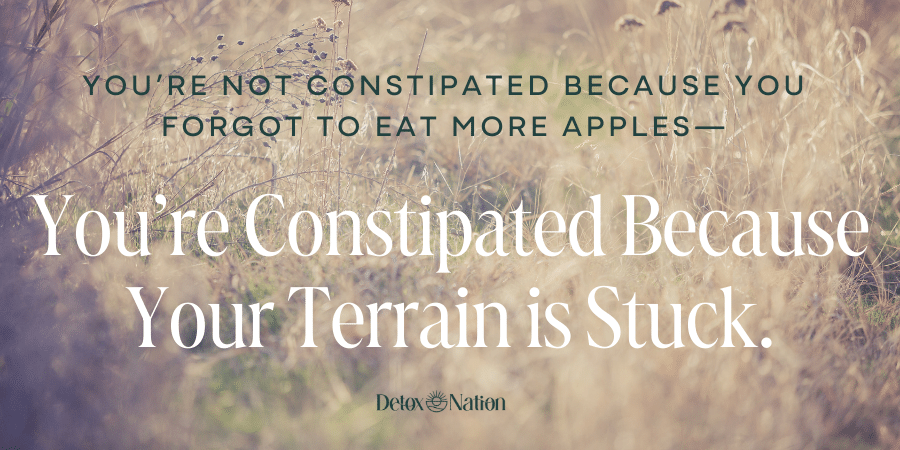
Frequently Asked Questions
Constipation can sometimes signal other health issues. It’s important to recognize when it might be more than a temporary inconvenience. Here are some common questions answered to help guide you.
What are some serious symptoms that can accompany constipation?
Severe symptoms of constipation include major bloating, severe abdominal pain, vomiting, or a noticeable swelling of the belly and might mean it’s an emergency. In such cases, it’s crucial to seek advice from a healthcare professional.
Is constipation ever an indicator of something serious like cancer?
While constipation is common and usually not serious, it can sometimes be a sign of colorectal cancer. This is rare, but if you experience symptoms like unexplained weight loss, blood in your stool, or persistent changes in bowel habits, consult with a healthcare professional.
How can long-term constipation affect your overall health?
Chronic constipation can lead to discomfort and might even cause complications like hemorrhoids or anal fissures. Over time, this can impact your quality of life and daily activities.
What are some other causes of infrequent bowel movements and severe constipation?
Other causes include age (older adults tend to experience constipation more than their younger counterparts); pelvic floor issues; spinal cord injury; and certain medical conditions can lead to constipation. For example, constipation is very common in Parkinson’s Disease or in any condition that causes your body to absorb too much water from the large intestines
When should an adult be concerned about constipation?
If you haven’t had a bowel movement in a prolonged period or are also experiencing other symptoms like severe pain or bloating, it’s time to be concerned. A healthcare professional can provide guidance and help you determine the cause and the best course of action.
Can you still pass gas if you’re severely constipated?
Yes, it’s still possible to pass gas even if you are constipated. However, if you notice a significant reduction in gas along with constipation, it might indicate a blockage.
Are there other (secondary) symptoms that are related to constipation?
Oh yes! As your body becomes more toxic, signs of liver overload and toxicity can abound. These can include headaches, brain fog that makes you feel like your head is filled with cotton, irritability where you snap at people for almost nothing, breakouts, oily skin, anxiety, horrible fatigue, itchy skin, jaundice, dark urine, pale stools, muscle cramps, hair loss that makes a mess in your shower (24), easy bruising (25), low libido (26), tinnitus, insomnia (27), lowered immunity, blood sugar imbalances (28), and more!
Start by taking my Parasite Assessment Quiz, supporting your liver, getting your bile flow back on track, and kicking out any unwanted squatters in your gut (looking at you, parasites).
It’s not glamorous work, but it’s fixable—and once you’ve tackled the root causes, you’ll love how much lighter (literally and figuratively) you feel. Go ahead, give your gut the green light—it’s time to get things moving again. I’m rooting for you!
Take My Parasite Assessment Quiz Now



